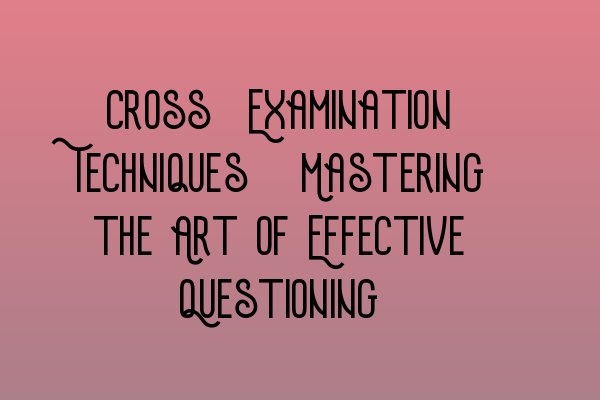Cross-Examination Techniques: Mastering the Art of Effective Questioning
Welcome to SQE Criminal Law & Practice Law UK! In this blog post, we’ll explore the art of effective questioning during cross-examination. Cross-examination is a crucial skill for every solicitor to master, as it allows you to challenge witnesses, test their credibility, and present your case in the most compelling manner possible.
Effective cross-examination techniques can make or break a case. By asking strategic and well-crafted questions, you can uncover the truth, expose inconsistencies, and weaken the opposing party’s arguments. In this article, we will discuss some key strategies and tips for mastering the art of cross-examination.
1. Prepare Thoroughly
Preparation is key to a successful cross-examination. Before entering the courtroom, ensure that you have a deep understanding of your case, the evidence, and the witnesses. Review all relevant documents, statements, and transcripts. This preparation will allow you to anticipate the testimony, identify areas of weakness, and formulate effective questions.
2. Start Strong
The opening questions of cross-examination should be strong and focused. These questions should set the tone and establish your credibility as a skilled solicitor. Use precise and straightforward language to grab the attention of the court, the jury, and the witness. By starting strong, you create a foundation for a successful cross-examination.
3. Use Leading Questions
Leading questions are an essential tool in cross-examination. By framing questions in a way that elicits a specific answer, you can control the witness’s testimony and shape their narrative. However, be careful not to exceed the boundaries set by the court. Leading questions should be used strategically to highlight inconsistencies or draw out favorable admissions.
4. Maintain Control
During cross-examination, it’s crucial to maintain control of the witness. Keep your questions short, clear, and focused. Avoid allowing the witness to engage in lengthy explanations or digress from the relevant issues. By maintaining control, you can steer the examination towards the areas that are most advantageous to your case.
5. Listen Carefully
Active listening is a skill that can greatly enhance your cross-examination. Pay close attention to the witness’s answers, body language, and nuances. By carefully listening, you can identify inconsistencies or contradictions in their testimony. These inconsistencies can be used to challenge the witness’s credibility and weaken their position.
6. Adapt and Pivot
Flexibility is key during cross-examination. Be prepared to adapt your line of questioning based on the witness’s responses. If a particular line of questioning is not yielding the desired results, be ready to pivot and explore alternative angles. Being adaptable allows you to maximize the effectiveness of your cross-examination and increase your chances of success.
Mastering the art of effective questioning during cross-examination takes time, practice, and dedication. By employing these techniques and consistently honing your skills, you can become a formidable solicitor. Remember, preparation, strong openings, leading questions, control, active listening, and adaptability are the keys to mastering the art of cross-examination.
If you’re interested in further preparation for the SQE exams, check out our related articles:
SQE 1 Practice Exam Questions,
SQE 1 Practice Mocks FLK1 FLK2,
SQE 2 Preparation Courses,
SQE 1 Preparation Courses, and
SRA SQE Exam Dates.
